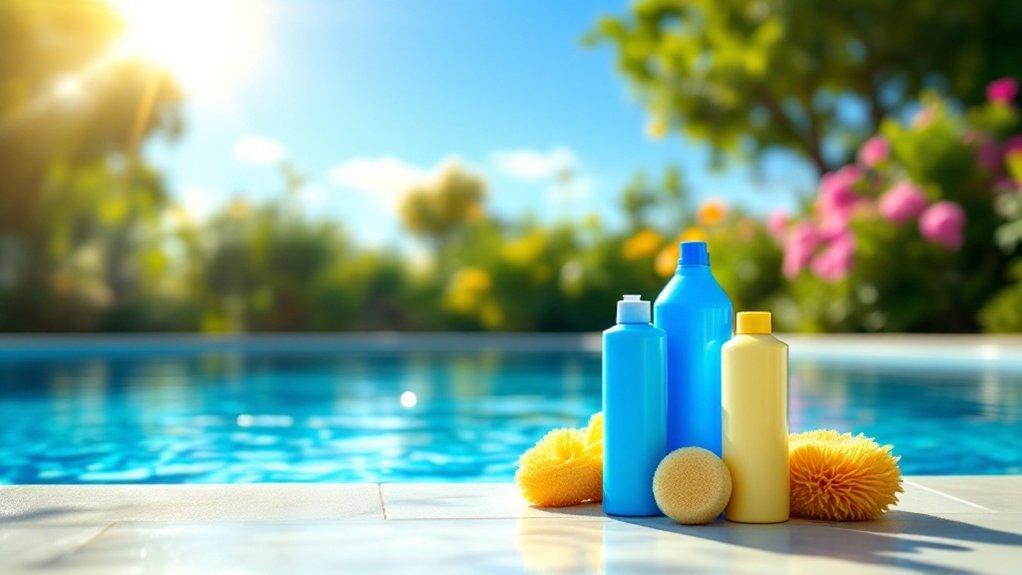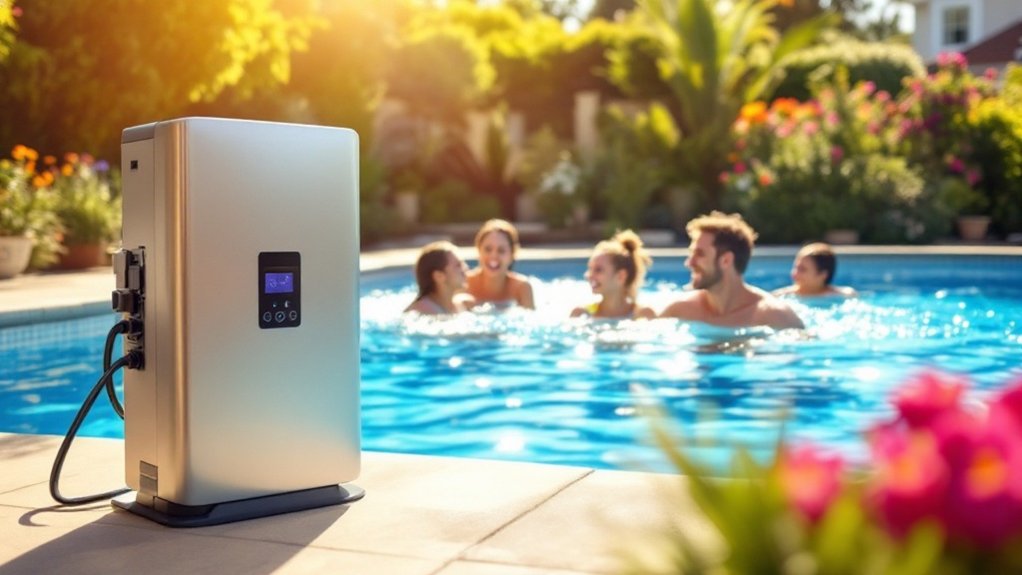Biodegradable pool cleaners represent a shift towards more sustainable cleaning solutions. These products utilize natural ingredients that break down easily, reducing environmental impact. They target organic debris effectively while ensuring water clarity. However, questions arise regarding their effectiveness compared to traditional options. Understanding their functionality and benefits can guide consumers in making informed choices. What factors should one consider when selecting the right biodegradable cleaner for their pool?
Understanding Biodegradable Pool Cleaners
As environmental concerns grow, many pool owners are turning to biodegradable pool cleaners as a sustainable alternative to traditional chemicals. These cleaners are formulated from natural ingredients that break down more easily in the environment, reducing the risk of pollution. Unlike conventional pool cleaning agents, which may contain harsh chemicals that can harm aquatic life and ecosystems, biodegradable options prioritize safety and environmental responsibility. Pool owners appreciate that these products often have fewer harmful side effects, making them safer for families and pets. Additionally, biodegradable cleaners can effectively maintain water clarity and hygiene without compromising the ecological balance. As awareness of environmental issues increases, the demand for these eco-friendly solutions continues to rise, reflecting a shift toward greener practices in pool maintenance.
How Biodegradable Pool Cleaners Work
Biodegradable pool cleaners operate through a blend of natural enzymes and surfactants that target organic debris and contaminants in the water. These cleaners work by breaking down substances such as oils, dirt, and algae, rendering them easier to remove. Enzymes act as catalysts, accelerating the decomposition of organic matter while surfactants reduce surface tension, allowing for better penetration and dispersion in the pool water. This combination enhances the overall cleaning efficiency without resorting to harsh chemicals. In addition, biodegradable cleaners are formulated to be effective across various water conditions, ensuring consistent performance. Users can apply these products directly to the pool, where they will naturally degrade and leave no harmful residues, making maintenance simpler and more eco-friendly.
Environmental Benefits of Using Biodegradable Cleaners
Biodegradable pool cleaners offer significant environmental advantages by reducing chemical pollution in aquatic ecosystems. Their composition guarantees that harmful substances do not leach into water bodies, thereby safeguarding marine life. As a result, these cleaners contribute to healthier water quality and promote biodiversity.
Reduced Chemical Pollution
The shift towards biodegradable pool cleaners represents a significant step in reducing chemical pollution in aquatic environments. Traditional pool cleaners often contain harsh chemicals that can seep into water systems, harming ecosystems and contributing to water quality degradation. In contrast, biodegradable options are formulated to break down naturally, minimizing their long-term impact. By selecting these eco-friendly products, pool owners actively decrease the amount of synthetic pollutants released into rivers, lakes, and oceans. This change not only promotes healthier aquatic habitats but also aligns with broader environmental sustainability goals. As awareness of the harmful effects of chemical runoff grows, the adoption of biodegradable cleaners becomes increasingly essential for responsible pool maintenance and environmental stewardship.
Safe for Aquatic Life
Choosing biodegradable pool cleaners not only reduces chemical pollution but also greatly benefits aquatic life. These eco-friendly products break down naturally, minimizing harmful residues that can leach into surrounding water bodies. When conventional cleaners are used, toxic substances can disrupt aquatic ecosystems, leading to detrimental effects on fish and other organisms. In contrast, biodegradable options are formulated with non-toxic ingredients, ensuring that they are safe for both freshwater and marine environments. By using these cleaners, pool owners contribute to the preservation of biodiversity, supporting healthy aquatic habitats. Ultimately, adopting biodegradable pool cleaners enhances the overall well-being of local ecosystems, promoting a sustainable approach to pool maintenance that aligns with environmental conservation efforts.
Effectiveness Compared to Traditional Pool Cleaners
Many pool owners are increasingly curious about the effectiveness of biodegradable pool cleaners compared to their traditional counterparts. Research indicates that while biodegradable options can effectively remove contaminants and maintain water clarity, their performance may vary depending on the specific formulation and concentration of active ingredients. Traditional pool cleaners often contain harsher chemicals that provide rapid results but may pose environmental risks. In contrast, biodegradable cleaners utilize natural ingredients, which may require more frequent application or a longer time to achieve the same level of cleanliness. Ultimately, the choice between these two types often hinges on individual priorities, such as environmental impact versus immediate cleaning efficacy. Pool owners should consider their specific cleaning needs and preferences when making a decision.
Factors to Consider When Choosing a Biodegradable Cleaner
When selecting a biodegradable pool cleaner, consumers should evaluate both the ingredients used and the safety standards it meets. Understanding the environmental impact assessment is also essential, as it informs the ecological footprint of the product. These factors collectively guide informed choices that align with sustainability goals.
Ingredients and Safety Standards
Selecting a biodegradable pool cleaner requires careful consideration of its ingredients and adherence to safety standards. Consumers should prioritize products that utilize natural, non-toxic components, ensuring they are free from harmful chemicals such as phosphates, sulfates, and artificial fragrances. Ingredients derived from plant-based sources are often preferred, as they are both effective and less likely to harm aquatic life. Additionally, certifications from recognized safety organizations can provide assurance that the product meets specific health and environmental standards. It is essential for users to thoroughly read labels and conduct research on the manufacturer’s practices. By focusing on safe and responsibly sourced ingredients, consumers can make informed choices that align with their health and environmental priorities while maintaining a clean pool.
Environmental Impact Assessment
While evaluating the environmental impact of biodegradable pool cleaners, several critical factors warrant consideration. First, the biodegradability rate must be assessed, as products that break down quickly are less likely to harm aquatic ecosystems. Second, it’s crucial to examine the source of raw materials; sustainable sourcing can reduce overall ecological footprints. Third, the potential toxicity of byproducts during decomposition should be evaluated to ascertain they do not pose risks to wildlife or water quality. Additionally, packaging materials should be eco-friendly to minimize waste. Finally, the overall effectiveness of the cleaner plays a role; a product that requires excessive use may negate its environmental benefits. By carefully analyzing these factors, consumers can make informed choices that promote eco-friendly pool maintenance.
Tips for Maintaining a Clean Pool With Biodegradable Products
Maintaining a clean pool using biodegradable products not only supports environmental sustainability but also guarantees a safe swimming experience. To effectively utilize biodegradable cleaners, pool owners should regularly test water chemistry, ensuring proper pH and chlorine levels. Regular skimming of debris from the surface and vacuuming the bottom helps minimize the buildup of contaminants. Additionally, using natural enzymes can aid in breaking down organic matter without harmful chemicals. It is advisable to brush pool walls and tiles weekly to prevent algae growth. Furthermore, maintaining the filtration system and replacing filters as needed will enhance water clarity. Finally, periodic shock treatments with biodegradable options can help reset water balance and keep the pool inviting for swimmers. Consistent care through professional pool cleaning services ensures that the pool remains in optimal condition year-round.
Frequently Asked Questions
Are Biodegradable Pool Cleaners Safe for Pets and Wildlife?
The safety of biodegradable pool cleaners for pets and wildlife largely depends on their specific ingredients. Generally, many biodegradable options are formulated to be less harmful, but thorough research on individual products is essential for ensuring safety.
How Long Do Biodegradable Pool Cleaners Take to Break Down?
Biodegradable pool cleaners typically break down within a few weeks to several months, depending on environmental conditions such as temperature, moisture, and microbial activity. Factors influencing decomposition rates include the cleaner’s chemical composition and formulation.
Can I Use Biodegradable Cleaners With Saltwater Pools?
Biodegradable cleaners can generally be used in saltwater pools. However, it is advisable to check the product specifications and consult manufacturers to guarantee compatibility with saltwater systems to avoid potential damage or reduced effectiveness.
Are There Any Specific Storage Requirements for These Cleaners?
Specific storage requirements for biodegradable cleaners often include keeping them in a cool, dry place away from direct sunlight and extreme temperatures, ensuring the containers are tightly sealed to maintain their efficacy and prevent contamination.
Do Biodegradable Pool Cleaners Have an Expiration Date?
Biodegradable pool cleaners generally do not have a strict expiration date; however, their effectiveness may diminish over time. It is advisable to check the manufacturer’s guidelines for specific recommendations regarding storage and usage duration.
Conclusion
Ultimately, biodegradable pool cleaners present a responsible choice for environmentally conscious pool owners. By utilizing natural ingredients, these cleaners effectively manage organic debris while minimizing ecological impact. Their effectiveness rivals that of traditional chemical cleaners, making them a practical alternative. When choosing a biodegradable option, it is crucial to take into account various factors to guarantee ideal results. With proper maintenance and the right products, pool owners can enjoy a clean and safe swimming environment that benefits both families and the planet.




